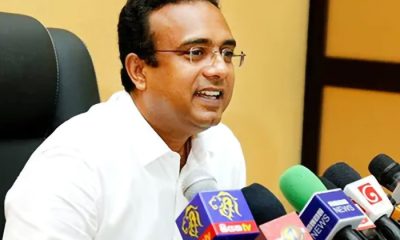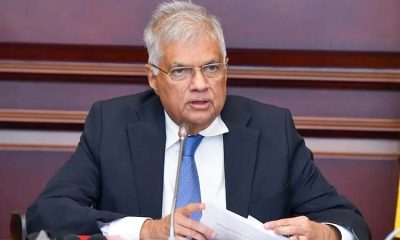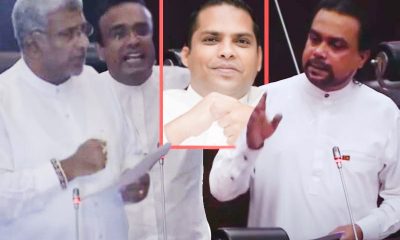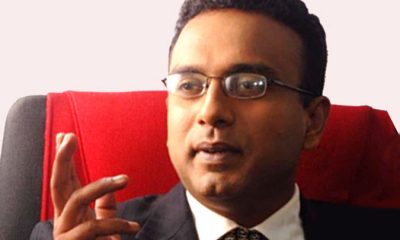News
Lankan workers in Middle East sending money, while more educated do not: Minister
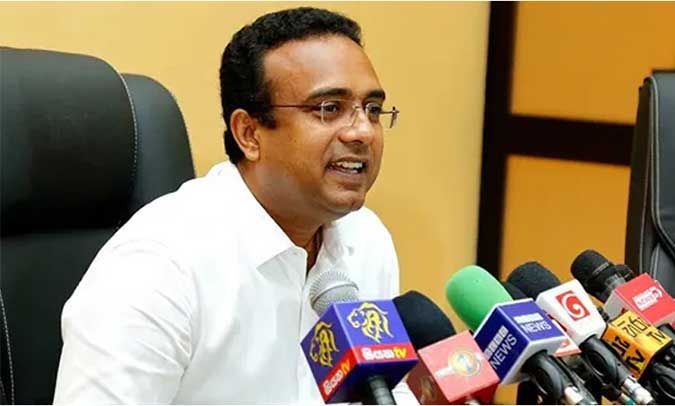
By NESHELLA PERERA
Millions of less affluent Sri Lankans works in the Middle East are sending money home to keep the economy afloat while the more educated who hold higher post in developed countries keep money stashed elsewhere, Labour Minister Manusha Nanayakkara said.
“The most amount of foreign exchange generated for Sri Lanka comes from the Middle Eastern region,” Nanayakkara said in Parliament.
“The ones who earn the least contribute to most of the remittances and those who hold bigger posts in developed countries, send very little money to the country because they are politically misled and will not send money.”
Many liberal developed nations give permanent resident status to foreign nationalized who can later become naturalized citizens, unlike nationalist nations like Sri Lanka critics say.As a result, they buy assets in those countries.
Middle Eastern nations also do not allow foreigners to settle permanently as a general rule.Sri Lanka is trying to raise salaries of workers in the Gulf, he said.
“We have discussed with Saudi Arabia, Oman, Kuwait and The United Arab Emirates to increase the salary earned by these women,” Nanayakkara said.
Many Sri Lankans are now leaving the country after the central bank printed money to maintain an artificially low policy rate and boost growth without working for it (output gap targeting or stimulus) under a discretionary flexible inflation targeting regime and collapsed the rupee.
Before the money printing central bank was set up in August 1950, Sri Lanka was a net importer of labour, like Dubai and Singapore.The weaker the currency the lower the salary that people will be prepare to migrate to countries with monetary stability.Sri Lanka has printed money for 73 years creating forex shortages, and with the support of economists in many cases have laid the blame on importers.In this crisis, the worst in the history of the central bank exporters were blamed and public money was used to track their transactions.
Minister Nanayakkara’s praise comes a few months after expat workers were themselves were scapegoated for sending money through unofficial gross settlement system which had been used for long distance maritime trade for centuries.
Remittances shifted to Undiyal/Hundi or Hawala settlement system from the formal banking system after the central bank printed money to artificially lower interest rates and maintain a fixed policy rate.Undiyal funds kept the country fed through open account trade, with the formal banking system was unable to prioritize as the newly printed money struggled to go out of the country through the credit system.
Sri Lanka’s remittances through official channels rose to 568 million US dollars in March 2023, up 78 percent from a year earlier, as parallel premiums declined as the central bank put brakes on money printing.( ECONOMYNEXT)
News
US sports envoys to Lanka to champion youth development

The U.S. Embassy in Colombo welcomed the U.S. Sports Envoys to Sri Lanka, former National Basketball Association (NBA) and Women’s National Basketball Association (WNBA) players Stephen Howard and Astou Ndiaye, from June 8 through 14.
The Public Diplomacy section of the U.S. Embassy said that it would launch a weeklong basketball program intended to harness the unifying power of sports, made possible through collaboration with Foundation of Goodness and IImpact Hoop Lab.
While in Sri Lanka, Howard and Ndiaye, both retired professional basketball players, will conduct a weeklong program, Hoops for Hope: Bridging Borders through Basketball. The Sports Envoys will lead basketball clinics and exhibition matches and engage in leadership sessions in Colombo and Southern Province for youth aged 14-18 from Northern, Uva, Eastern and Western Provinces, offering skills and leadership training both on and off the court. The U.S. Envoys will also share their expertise with the Sri Lanka Basketball Federation, national coaches, and players, furthering the development of basketball in the country. Beyond the clinics, they will collaborate with Sri Lankan schoolchildren to take part in a community service project in the Colombo area.
“We are so proud to welcome Stephen and Astou as our Sports Envoys to Sri Lanka, to build on the strong people-to-people connections between the United States and Sri Lanka,” said U.S. Ambassador Julie Chung. “The lessons that will be shared by our Sports Envoys – communication, teamwork, resilience, inclusion, and conflict resolution – are essential for leadership development, community building, equality, and peace. The U.S. Sports Envoy program is a testament to our belief that sports can be a powerful tool in promoting peace and unity.”
News
Rahuman questions sudden cancellation of leave of CEB employees

SJB Colombo District MP Mujibur Rahuman in parliament demanded to know from the government the reasons for CEB suspending the leave of all its employees until further notice from Thursday.
MP Rahuman said that the CEB has got an acting General Manager anew and the latter yesterday morning issued a circular suspending leave of all CEB employees with immediate effect until further notice.
“We demand that Minister Kanchana Wijesekera should explain this to the House. This circular was issued while this debate on the new Electricity Amendment Bill was pending. There are many who oppose this Bill. The Minister must tell parliament the reason for the urge to cancel the leave of CEB employees,” the MP said.However, Speaker Mahinda Yapa Abeywardena prevented Minister Wijesekera responding to the query and said that the matter raised by MP Rahuman was not relevant.
News
CIPM successfully concludes 8th Annual Symposium

The Chartered Institute of Personnel Management (CIPM) successfully concluded the 8th Annual CIPM Symposium, which took place on 31st May 2024. Themed “Nurturing the Human Element—Redefining HRM in a Rapidly Changing World,” the symposium underscored the pivotal role of human resource management (HRM) in today’s dynamic global landscape. Since its inception in 1959, CIPM has been dedicated to advancing the HR profession through education, professional development, and advocacy, solidifying its position as Sri Lanka’s leading professional body for HRM.
Ken Vijayakumar, the President of the CIPM, graced the occasion as the chief guest. The symposium commenced with the welcome address by the Chairperson, Prof. Arosha Adikaram, followed by the Web Launch of the Symposium Proceedings and Abstract Book by the CIPM President. The event featured distinguished addresses, including a speech by Chief Guest Ken Vijayakumar, President of CIPM, and an address by Guest of Honor Shakthi Ranatunga, Chief Operating Officer of MAS Holdings Pvt. Ltd., Sri Lanka.
The symposium also featured an inspiring keynote address by Prof. Mario Fernando, Professor of Management and Director of the Centre for Cross Cultural Management (CCCM) at the University of Wollongong, Australia.
Vote of Thanks of the inauguration session was delivered by Dr. Dillanjani Weeratunga, Symposium Co-chair.
The symposium served as a comprehensive platform for researchers to present their findings across a wide range of critical topics in HRM. These included Cultural Diversity and Inclusion, Talent Development and Retention, Ethical Leadership and Corporate Social Responsibility, Adapting to Technological Advancements, Mental Health and Well-being at Work, Global Workforce Challenges, Employee Empowerment, and Reskilling and Upskilling.
The plenary session was led by Prof. Wasantha Rajapakse. Certificates were awarded to the best paper presenters during the valedictory session, followed by a vote of thanks delivered by Kamani Perera, Manager of Research and Development.
The annual symposium of CIPM was a truly inclusive event, attracting a diverse audience that spanned undergraduates, graduates, working professionals, research scholars and lecturers. This widespread interest highlights the symposium’s significance in the field of HRM, offering a unique opportunity for everyone to network and learn from scholarly brains.The CIPM International Research Symposium was sponsored by Hambantota International Port, Sri Lanka Institute of Information Technology (SLIIT), E B Creasy & Co. PLC, and Print Xcel Company.


